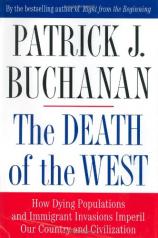The Death of the West: How Dying Populations and Immigrant Invasions Imperil Our Country and Civilization
Review
The Death of the West: How Dying Populations and Immigrant Invasions Imperil Our Country and Civilization
I have no idea why Patrick Buchanan chose to run for President of the United States in the 2000 elections. He is unelectable. Impossible to pigeonhole, stubbornly iconoclastic, he speaks his mind and does not kowtow to any particular group. The left, from the mainstream media pundits on down, have put a pox upon him for his unapologetic defense of the unborn and his classification of homosexuality as a disorder rather than as a lifestyle choice. Does he sound like your dad, or your uncle, the one who still has the Goldwater/Miller bumper stickers on the car? Well...not really. The right has recoiled from him as well, aghast at his socialistic clarion call for a "living" or "family wage" and his misty-eyed recollection of the day when there was a 90 percent tax bracket, not to mention his habit of cheerfully breaking bread with radical feminists and cozying up to Russian newspaper publishers.
No matter where the point of the political spectrum is that you may choose to call home, however, you will find lots to agree, disagree and, most importantly, think about in THE DEATH OF THE WEST. Buchanan's basic thesis --- and this is an oversimplification --- is that American culture has become corrupted from within; as the culture has become corrupted, the people have turned from religion to material satisfaction, and in the process of seeking and acquiring material goods have delayed the conception of children or have forgone it altogether; in order to maintain the workforce, the nation and its industry have turned to immigrants, both legal and illegal, who have no interest in assimilating into American culture but instead maintain loyalty to their native country. The result, concludes Buchanan, will be the Balkanization of the United States.
It should be stated at the outset that treatises such as these that attempt to postulate the future require a simultaneous suspension of disbelief coupled with a leap of faith. Paul Ehrlich's THE POPULATION BOMB, with its gloom and doom prophecy of an expanding population exhausting the earth's resources well before the end of the 20th Century, is sidesplitting in its unintended hilarity. Similarly, EARTH IN THE BALANCE by Al Gore, wherein the combustion engine is classified as the most dangerous instrumentality devised by human beings, is a simultaneous inducement for eye rolling and eyelid closing. So, too, when Buchanan looks at present birth rate levels and states that "If this...then that by 2025...(or 2050)," he is whistling in the wind. The attack on America on September 11 fostered, among many other things, a spontaneous jump in the conception rate, which, all other things being equal, will be felt this coming summer. There are any number of factors, benign or malevolent, which could cause illegal Mexican immigrants to return to the country of their birth of their own accord in 10 years. It is quite simply very, very difficult to predict the future.
Where Buchanan shines is in his recounting of the historical events that have caused the United States to reach the cultural point where it is today. There are many who will argue as to whether there has been a change for better or for worse since the 1950s; what is inarguable is that there has been a change. Buchanan carefully enumerates the events and incidents, the whys and wherefores, that have transformed American society. He also raises issues that are considered impolitic to mention. He jumps, for example, into a discussion of hate crimes. What is the incidence of white on black crime? Is the occurrence of black on white crime properly classified as a hate crime as well? Why or why not? Which occurs more frequently? If there is going to be such a classification as a "hate crime," how can a standard for such acts be legitimately established without a discussion of such factors? And on what basis do those who are against such discussion oppose it?
THE DEATH OF THE WEST was controversial even before its official publication, and will undoubtedly become more so as it becomes more widely distributed and read. While it is doubtful that THE DEATH OF THE WEST will change anyone's position, it will undoubtedly raise issues in the minds of its readers that should, and in some cases must, be considered.
Reviewed by Joe Hartlaub on December 12, 2001
The Death of the West: How Dying Populations and Immigrant Invasions Imperil Our Country and Civilization
- Publication Date: December 12, 2001
- Genres: Nonfiction
- Hardcover: 320 pages
- Publisher: Thomas Dunne Books
- ISBN-10: 0312285485
- ISBN-13: 9780312285487




